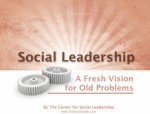Monthly Newsletter: You Got the Right One, Baby? by Stephen Palmer
Published: Mon, 11/01/10
 "Empowering Ordinary Citizens to Make an Extraordinary Difference"
|
|
You Got the Right One, Baby?
"We know more than we know we know." -Michael Polanyi
LAST WEEK I ASKED YOU WHY YOU THINK I've been publishing poetry every
Sunday on the Center for Social Leadership blog.
Aside from the obvious answer that quality poetry inspires,
the short answer is this: Poetry activates the right hemisphere of your
brain, which social leaders need
in order to increase their impact and effectiveness.
Now for the detailed answer.
1 Brain 2 Brains, Left
Brain Right Brain
In 1981, neuropsychologist and neurbiologist Roger Sperry won a Nobel
Prize "for his discoveries
concerning the functional specialization of the cerebral hemispheres."
Before Dr.
Sperry's "split-brain experiments," it was commonly thought that the left
hemisphere of the brain was more important than the right.
Dr. Sperry shattered
this false view and revealed stunning new insights into how the brain works.
As he put it,
"The so-called subordinate or minor hemisphere, which we had formerly supposed to be illiterate and mentally retarded and thought by some authorities to not even be conscious, was found to be in fact the superior cerebral member when it came to performing certain kinds of mental tasks." The left brain
is linear, logical, objective, verbal, and conceptual. The right
brain, visual and perceptual, reasons holistically, recognizes patterns, and interprets emotions and
nonverbal expressions.
The left brain
is scientific, the right is intuitive, artistic, creative, imaginative. The left brain
craves order, the right feeds on chaos. The left brain demands everything to be
literal, while the right brain is electrified by symbols, metaphors, art,
and abstractions.
The left brain
sees a sentence like "Her heart soared to the heavens" and smirks, "What a load
of crap." The right brain gushes, "Wow! Cool! Can I soar, too?"
"Good poets make extensive use of 'right-brain language.' Forget that sensible, linear, factual, left-brain speech. The language of the right brain is a horse of a different color. A riot of imagery, a cascade of connections, sensations, and associations. The right brain speaks in metaphors, juxtapositions, and similes, using a whole range of poetic devices to express the inexpressible and describe the indescribable." -Robin Frederick Clearly, both
hemispheres are vital to success in any endeavor. Unfortunately, our society
and educational system have traditionally placed way more emphasis on the left.
However, we're
engulfed in monumental shifts. To navigate these shifts and leverage them to
your advantage requires a much higher degree and depth of right-brain thinking
than most people are used to.
For social leaders in particular,
cultivating your right brain is vital for at least the following reasons:
Right-Brain
Economics
In his phenomenal bestseller A
Whole New Mind: Why Right-Brainers Will Rule the Future (affiliate link), Daniel Pink draws from
mountains of research to explain that we're moving from the Information Age to
the Conceptual Age.
"We've progressed from a society of farmers to a society of factory workers to a society of knowledge workers. And now we're progressing yet again--to a society of creators and empathizers, of pattern recognizers and meaning makers."
Pink cites three primary reasons
for this cataclysmic shift:
Abundance
"Our left brains have made us rich...But abundance has produced an ironic result: The very triumph of [left-brain] thinking has lessened its significance. The prosperity it has unleashed has placed a premium on less rational, more [right-brain] sensibilities--beauty, spirituality, emotion." Asia
"If standardized, routine [left-brain] work such as many kinds of financial analysis, radiology, and computer programming can be done for a lot less overseas and delivered to clients instantly via fiber optic links, that's where the work will go." Automation
"Last century, machines proved they could replace human backs. This century, new technologies are proving they can replace human left brains." To adapt to these forces, Pink
offers six requisite senses for thriving in the Conceptual Age--all of which are
decidedly right-brain aptitudes:
Pink challenges individuals and
businesses to ask themselves three questions:
He then concludes:
"Individuals and organizations that focus their efforts on doing what foreign knowledge workers can't do cheaper and computers do faster, as well as on meeting the aesthetic, emotional, and spiritual demands of a prosperous time, will thrive. Those who ignore these three questions will struggle." Get Out of the Box
Change has never been more fundamental, rapid, and
disruptive. More than ever, today's leaders must learn to recognize, trust, and
follow their intuition to connect dots, predict trends, and adapt to new
realities.
And where does intuition come from? You guessed--the right
brain.
Roy H. Williams, author of the legendary Monday Morning Memo and founder of Wizard Academy, explains:
Accessing and cultivating intuition is how social leaders
can successfully navigate change, overcome challenges, and solve problems.
To create different results, we need new ways of thinking,
and left-brain thinking isn't going to get us there.
(By the way, if you want to test your intuition, read this article
and connect the dots between Oliver's thesis and what I'm saying here.)
Fight for the Right
In his eye-opening--and highly intuitive--lecture "The Freedom
Crisis," Oliver DeMille declares that one of the serious flaws of
freedom-lovers is that we tend to think and communicate very literally.
The problem with this, as Oliver says, is that
"Literal talk is not what sways the thinking populace. The thinking populace is swayed by symbol, celebrity, and poetry--poetry in the broad sense." Literal language is divisive. It repels people with whom we
share common beliefs and goals. Symbolism and poetics, on the other hand, speak
to universalities. They unite and inspire.
To change hearts and minds and win the freedom war
requires us to be artful rather than forceful. In other words, passionate
freedom-lovers must take a more right-brain approach to their struggle.
Oliver goes on to explain the difference between sensus
solum and sensus plenior.
Sensus solum translates as "one meaning," while sensus
plenior means "multiple, or fuller meanings."
Sensus solum--or literal--thinking has dominated mainstream
education for decades. It trains the masses to think in terms of black or
white, right or wrong. Sensus solum thinkers read things to find the correct
answer. It is rigid and, by definition, limited.
In contrast, sensus plenior education--of which poetry is an
integral component--explores depth, nuance, multiple perspectives, and holistic
thinking. It fosters creativity and innovation.
Bottom line: sensus solum is left-brain thinking, sensus
plenior is right-brain thinking.
Which is needed to promote freedom?
Trick question--we don't
need either/or, we need both. Just as
those who cultivate both left and right brain aptitudes will have greater
success economically, so will they have greater impact on the freedom movement.
Still, since sensus solum is the dominant perspective most
of us have been trained in, it is vital that we cultivate the ability to think
in terms of sensus plenior--which means specific and consistent right-brain
training.
Get the Right Stuff
"We cannot solve our problems with the same thinking we used when we created them." -Albert EinsteinThis isn't "touchy-feely, artsy-fartsy" stuff--the realities of right-brain thinking are tangible, practical, relevant, and vital. Nurturing your right brain makes you more
creative, imaginative and innovative, and better equipped to solve problems,
overcome challenges, and make better decisions. It helps you recognize, predict, and capitalize on trends. It helps you communicate more effectively and universally.
In short, it makes you a better entrepreneur and leader. And
it's the right thing to do. Uh-huh.
10 Specific Ways to Cultivate Your Right Brain
1. Attend Wizard Academy courses, including and especially my class in December. Email me at [email protected] to learn how to receive a 50% discount on the class.
2. Take art, music, acting, and/or dancing classes. Starve your inhibitions, gorge your imagination.
3. Visit art museums and galleries.
4. Practice writing short stories. One valuable and quick
technique is to do what I've done on this blog. Another is "mini-sagas"--stories consisting of
no more than 50 words.
5. Keep a notepad and pen on your nightstand and write down your dreams. Dreams are your right brain communicating
to your left; it has no language functions, so it communicates through symbols. Record not only
what you visualized, but also how it felt. Try to interpret the symbolism and apply your interpretations to practical things in your life. Compare your dreams over time to recognize patterns.
6. Read more fiction, fantasy, poetry, and humor.
7. Listen to more classical music.
8. Play more. Seriously. Video games, sports, board games,
concerts, leisure time. Intuition kicks in more often and more clearly when you
have no deadlines or objectives. Simply play. If you think this sounds silly, consider that Nobel Prize-winning physicist Richard Feynman was a huge proponent of play.
9. Meditate at least 15 minutes every day.
10. Read and listen to these books, articles, and speeches:
*****************************  Stephen Palmer is a marketing consultant and persuasive writer with KGaps Consulting, a co-founder of The Center for Social Leadership, and the New York Times best-selling co-author of Killing Sacred Cows: Overcoming the Financial Myths that are Destroying Your Prosperity. Stephen Palmer is a marketing consultant and persuasive writer with KGaps Consulting, a co-founder of The Center for Social Leadership, and the New York Times best-selling co-author of Killing Sacred Cows: Overcoming the Financial Myths that are Destroying Your Prosperity.He is a liberal-arts graduate of George Wythe University and a graduate and faculty member of the "non-traditional business school" Wizard Academy.
Stephen resides in Round Rock, Texas with his gorgeous wife Karina, awesome son Alex, and princess daughters Libby, Avery, and Laela. Stephen and Karina blog about their magical life on Palmer Journeys.
Connect With Stephen:Email: spalmer [at] thesocialleader [dot] com |
Connect & Engage
Recent Blog Articles
By Oliver DeMille
By Oliver DeMille
By Bryan Hyde
By Dave Wilson By Oliver DeMille By Garrett Gunderson
By Mike Wilson
Free PDF Downloads
|
www.TheSocialLeader.com |



